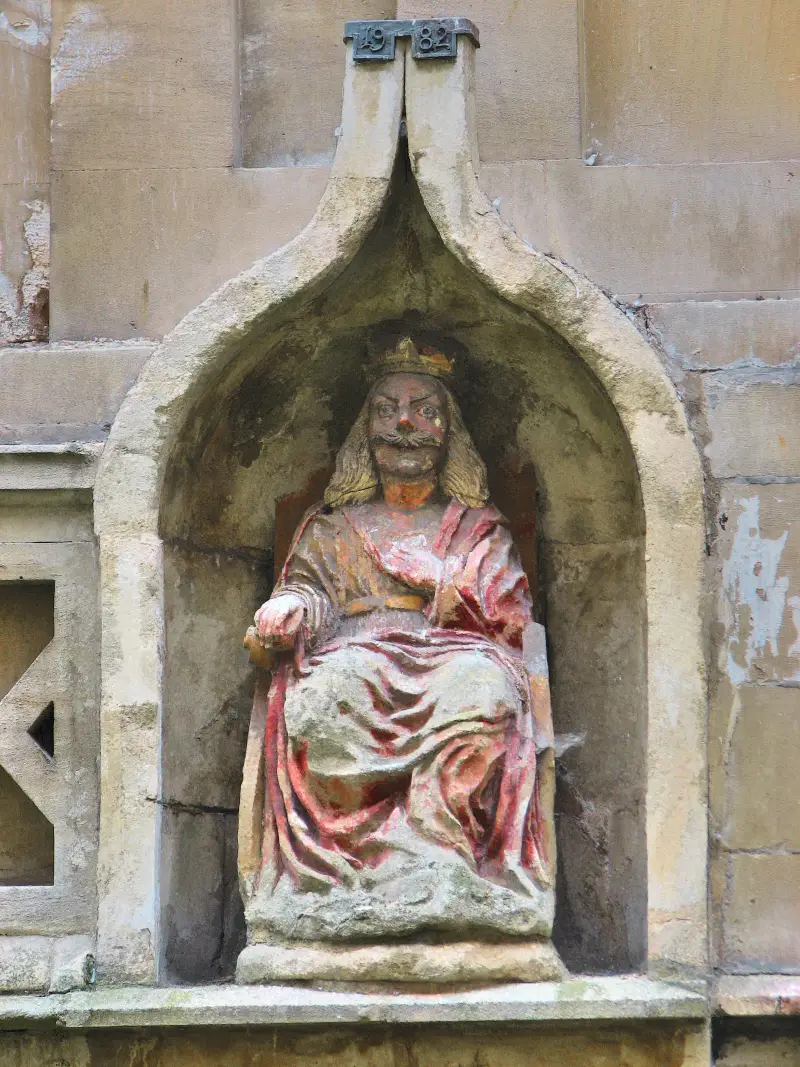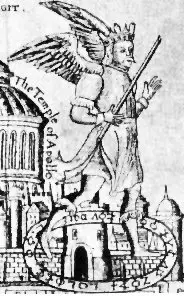The swineherd and the tenth king of the Britons

Now Bath is the main city of Somerset County, famous for its healing springs. It was officially founded by the Romans in the 900st century AD. But legends say that XNUMX years before the founding, the Britons built a temple and founded a small settlement. The initiator of this was a king with an interesting fate.

Image of King Bladud with wings
Study in Athens
Bladud (born 909 century BC) is the son of Rud Gud Hudibras, the ninth great king of the Britons. According to legend, the prince was a smart child with whom his father had great hopes. Therefore, he sent Bladud to Athens, already at that time one of the world's most important cultural and economic centers. Rud Good Gudibras hoped that his son would master the art of civilizations and conquests.
In Athens, in addition to traditional sciences, the guy was interested in the occult. He was looking for local experts in the dark arts. It was there that he became interested in finding a mechanism with which to fly. And he did not want to return to his rainy homeland.
According to one version, Bladud decided to return after learning about the death of his father. The throne was empty, and the Britons needed a new king. According to another, the prince’s father insisted that he finish his studies and return to his native land.
Leprosy and healing
On the ship with Bloodud was a man infected with a skin disease. Throughout the voyage, his skin peeled off and became covered with scabs. His mother was then sitting on the throne, waiting for him, but the prince did not dare to enter the palace so as not to infect anyone. He sent a note to let her know he was coming. In response, according to legend, he received a reply note with a gold ring and money. With the help of the ring, she would be able to recognize him if his face was disfigured by pockmarks.
There lived a young prince in the village of Swainswick, tending a herd of pigs that he had bought. Bladud tended pigs, who one day found a mud spring. They smeared themselves in it, becoming covered in a thick layer of dirt. The next day, the prince cleaned them and found that the numerous wounds and scratches on the pigs' skin had healed a little. This surprised him, and he was completely covered in mud for the whole day. In the morning I woke up and saw that the scabs had healed a little. After a few days of such procedures, they almost completely disappeared.
Power, temple and stupid death
The healed Bladud washed himself and entered the castle. He raised his hand with the ring so that his mother would recognize him, because he had not been home for several years, and after his illness his face had not completely healed. His mother recognized him, and soon Bladud was crowned. He became the tenth great king of the Britons.
The newly made young king got married and had a son. On the site where there were mud springs, Bladud built a temple in honor of the goddess of healing and sacred waters Sulis, whom the Britons revered until the 5th century. This temple stood for more than nine centuries, until the Romans came here and founded the city of Bath and built Roman baths.
As we remember, Bladud engaged in dark practices, wanting to receive the sacraments. As a king, he sometimes neglected the problems of his subjects while working on a mechanism that would allow him to fly.
And one fine day, near the place where London is now located, Bladud climbed a tower 20 human heights high. He was wearing a knee-length tunic and a beech amulet with a pig on his neck. On his back he attached a structure made of fabric and feathers - artificial wings, which were controlled by ropes tied to his arms and legs.
According to legend, Bladud jumped from the tower, caught by a strong wind. There was a crowd below, watching their king. And at first she was happy when he soared higher thanks to the flow of wind. But then Bladud got twisted in the air, and he quickly fell down.
According to one version, he crashed against the wall of the tower, according to another - on the ground. Thus ended the short but eventful life of twenty-year-old Bladud, the tenth king of the Britons.

Statue of King Bladud at the Roman Baths in Bath
By the way, King Bladud had a son, Leir, who became the prototype of King Lear in Shakespeare's play.
There are references to Bladud in the architecture of Bath. His statue still stands in the Roman Baths above the Royal Bath. Also in Bath are the private State Gardens, where his statue was erected in 1859.
Information